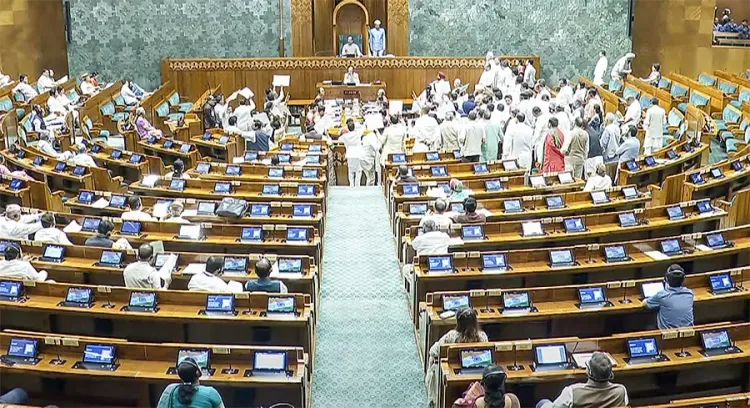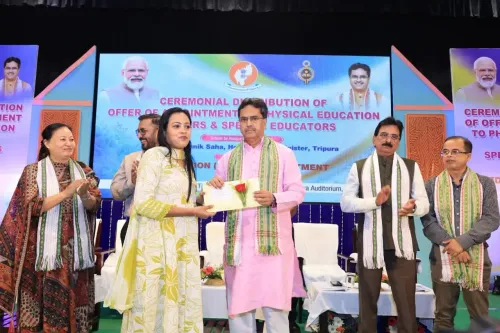Did the LS Pass Two Key Sports Bills Amid Uproar?

Synopsis
Key Takeaways
- National Sports Governance Bill aims to reform sports administration in India.
- National Anti-Doping Amendment Bill strengthens anti-doping measures.
- Legislative changes align India with international sports standards.
- Establishment of a National Sports Board to oversee federations.
- Push for athlete welfare and transparency in governance.
New Delhi, Aug 11 (NationPress) As India positions itself for a potential bid for the 2036 Olympic Games, the Lok Sabha has successfully passed two significant pieces of legislation - the National Sports Governance Bill, 2025 and the National Anti-Doping (Amendment) Bill, 2025 - all while facing considerable disruption from opposition members.
Both Bills were approved via a voice vote, with the government advancing amid the uproar in the House.
Chairing the session, Sandhya Rai acknowledged that these laws, proposed jointly by Union Youth Affairs and Sports Minister Mansukh Mandaviya, represent a critical advancement in reforming India’s sports governance and aligning its anti-doping regulations with international standards.
This legislative progress comes as India engages in a “Continuous Dialogue” with the International Olympic Committee (IOC) to lay the groundwork for a formal bid to host the Olympic Games.
Before the Bills were presented, Mandaviya described the Sports Governance Bill as a necessary move to establish transparency, athlete welfare, and ethical practices across sports federations.
“Sports is not a new subject. Reforms began in 2014 with the Khelo India movement. Today, our athletes are excelling on the global stage, and this Bill ensures they receive the training and facilities they deserve,” he remarked.
This Bill proposes the creation of a National Sports Board to oversee and recognize National Sports Federations (NSFs), including autonomous bodies like the BCCI. It requires compliance with the Olympic Charter, the Paralympic Charter, and international best practices.
A National Sports Tribunal is also envisioned to resolve disputes related to athlete selection, federation elections, and governance matters, while a National Sports Election Panel will ensure fair elections within sports organizations.
The amendment to the National Anti-Doping Act, 2022, which was also passed, seeks to strengthen the independence of the National Anti-Doping Agency (NADA) and its appeals panel, addressing concerns from the World Anti-Doping Agency (WADA) regarding potential government interference.
These amendments aim to align India’s anti-doping framework with the WADA Code, enhancing credibility in international sporting arenas.
Nonetheless, the legislative process encountered significant challenges. As BJP MP Ganesh Singh began to advocate for the Bills, opposition members surged into the Well of the House, vocally disrupting the proceedings. The specifics of their slogans and remarks were largely inaudible.
In spite of the tumult, Mandaviya pressed on for the simultaneous passage of both Bills, which was promptly granted. Support for the legislation was also voiced by TDP MP Kesineni Sivanath from Vijayawada, Andhra Pradesh, highlighting cross-party acknowledgment of the need for reform, despite ongoing opposition.
Additionally, Finance Minister Nirmala Sitharaman introduced a comprehensive Bill aimed at consolidating and amending the Income-tax Act of 1961, designed to simplify tax language, enhance digital compliance, and redefine undisclosed income to encompass virtual assets.
Union Minister G Kishan Reddy also presented amendments to the Mines and Minerals (Development and Regulation) Act to facilitate state-backed overseas acquisitions of essential minerals like lithium and cobalt, which are crucial for India’s energy and defense sectors.
Furthermore, a series of standing committee reports were presented, addressing topics ranging from India’s Indian Ocean strategy to the implementation of the National Education Policy in higher education.
Notably, Darshan Singh Choudhary delivered the 362nd report of the Standing Committee on Education, Women, Children, Youth and Sports, detailing government responses to prior recommendations.
Despite the challenges, the day's activities indicated a robust legislative drive by the government to push forward structural reforms across sports, finance, and resource governance - each playing a significant role in enhancing India’s global stature and domestic development.









